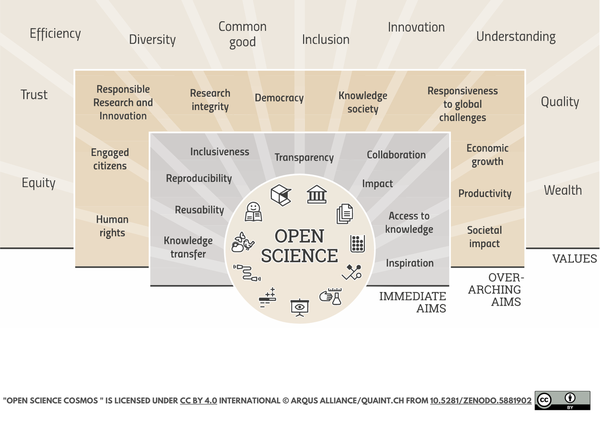Open Science
Definition of Open Science
Open Science (OS) is a set of good practices, principles, and goals that aim to reduce barriers in all aspects of the research process, for the benefit of research itself and society.
Good practices include transparency, accessibility, reproducibility, reliability, participation, and inclusiveness in all parts of the research process.
Open Science increases the efficiency of research by making scientific knowledge findable, accessible, interoperable, and reusable, accelerating progress and discoveries, for the common good.
The most immediate applications of Open Science include the dissemination of research through open access publishing, the sharing of data and research methods, and the provision and use of open infrastructures. It means opening up all the outputs of scholarly production (publications, data, laboratory notes, records, software, algorithms, protocols, procedures, workflows, and models), allowing them to be reused and redistributed. Open Science also encompasses practices such as pre-registration, crowdsourcing, pre-press publishing, and open peer-review.
Ideally, Open Science makes research processes and results accessible to everyone worldwide, with no financial, legal, or technical barriers, and invites participation, discussion, questioning, and reuse.
The term Open Science is a dynamic concept that has grown to include the concepts of Citizen Science, Open Education, and Open Innovation.
Citizen Science
Citizen Science includes the active participation of laypeople in research activities to generate new knowledge in the cooperation of science and society. Citizen Science approaches allow for the inclusion of citizens' perspectives, experiences, and expertise, thereby strengthening the societal relevance of research questions and research projects, as well as increasing the potential of bidirectional knowledge transfer and productive use of research outcomes in and for society.
Open Education
Open Education aims at offering high-quality learning environments and materials to everyone to widen access and participation. It is mainly included in the form of Open Educational Resources, which encompass resources, tools, and practices that provide access to a variety of formal and informal education opportunities.
Open Innovation
Open Innovation is characterized by a networked, dynamic ecosystem where actors from different environments – businesses, academia, civil society, or governments – become part of the innovation process. Building on collaboration and co-creation, Open Innovation facilitates and accelerates knowledge circulation and its transformation into products and services and can foster economic growth and help solve societal challenges.
Pillars of Open Science
The main components of Open Science are:
- Open Access (to publications)
- Open Data (including Open management of research data, Data Management Plans, FAIRness of data and archives)
- Open Infrastructures (including support staff, Open Source software, tools, repositories, and Open Laboratories)
- Open Reproducible Research (including source code, preregistration, materials, workflows, protocols, and laboratory notes)
- Open Science Evaluation (including Open Metrics, research assessment, and Open Peer Review)
- Open Science Policies (on the part of institutions and financing bodies)
- Citizen Science
- Open Education
- Open Innovation
University of Padua Open Science Commission
The University of Padua Open Science (OS) Commission is committed to fostering OS initiatives, exploring new publishing models and linking OS practices with futureproof criteria for Research and career assessment
Learn more about the University of Padua Open Science Commission (ITA)
Insights
- UNESCO: Recommendation on Open Science
- EU Grants: Annotated Model Grant Agreement: v0.2 DRAFT, 30/11/2021
- FOSTER
- Arqus: Arqus Mission statement: Strategies & Goals 2019-2025, 2019
- Arqus: Arqus Opennes Position Paper, 2022, DOI: 10.5281/zenodo.5881903
- LERU: Implementing Open Science - Challenges and Opportunities for research-intensive universities, 14/12/2020
- EUA: Universities without walls - A vision for 2030, 04/02/2021
- FAIR Principles: GO FAIR
- Open Infrastructures: The Principles of Open Scholarly Infrastructure, 2020
- Alternative metrics: Open Science: Altmetrics and Rewards. Horizon 2020 Policy Supporto Facility, 2018, DOI: 10.2777/468970
Library Helpline
If you need any further information, please contact the Library Helpline. Select:
- "Supporto alla pubblicazione accademica" (Scholarly publishing support)
- "Consulenza tematiche diritto d’autore" (Copyright support)
- "Supporto Open Science (Open Access, Open Data)" (Open Science support)
